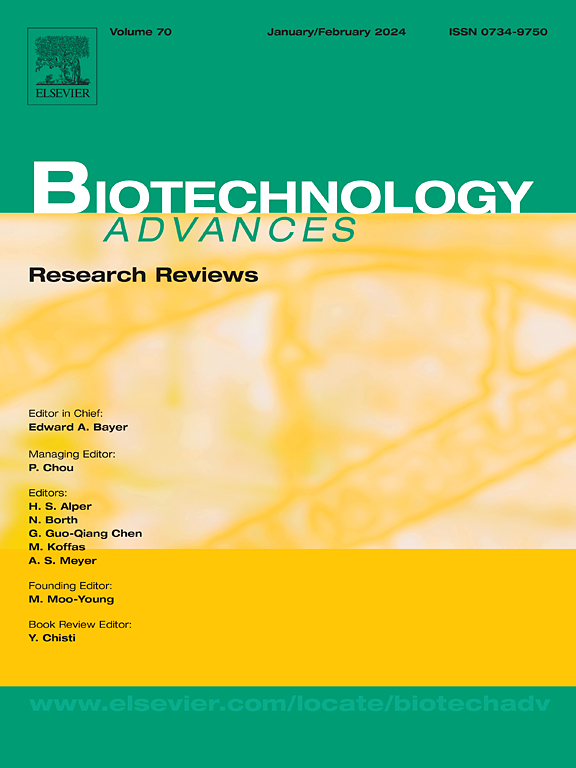蛋白酶工程:方法、工具和新兴趋势
IF 12.1
1区 工程技术
Q1 BIOTECHNOLOGY & APPLIED MICROBIOLOGY
引用次数: 0
摘要
具有定制底物特异性和活性的工程蛋白酶可以在生物医学,基于质谱的蛋白质组学以及化学和合成生物学中实现广泛和创新的应用。这篇综述提供了权威的、局部的、详细的描述和讨论了定向进化和高通量策略,旨在设计蛋白酶在大肠杆菌、酵母、噬菌体和无细胞系统中的底物特异性。其次,我们讨论了补充定向进化的新兴蛋白酶工程策略,包括实现接近催化的抗体-蛋白酶融合,以及由外源蛋白质-蛋白质相互作用驱动的蛋白酶底物特异性切换。最后,我们讨论了工程分裂和自抑制蛋白酶的原理,它们是蛋白质电路中关键的信号处理模块。总体而言,读者将获得蛋白酶工程最新进展的宝贵理解,重点是能够精确控制蛋白酶活性和特异性的方法和策略。本文章由计算机程序翻译,如有差异,请以英文原文为准。
Protease engineering: Approaches, tools, and emerging trends
Engineered proteases with bespoke substrate specificities and activities can empower broad and innovative applications in biomedicine, mass spectrometry-based proteomics, and chemical and synthetic biology. This review provides an authoritative, topical, and detailed description and discussion of the directed evolution and high-throughput strategies designed to engineer the substrate specificity of proteases in E. coli, yeast, phage, and cell-free systems. Second, we discuss emerging protease engineering strategies that complement directed evolution, including antibody-protease fusions that enable proximity catalysis, and protease substrate specificity switching driven by exogenous protein-protein interactions. Lastly, we discuss principles for engineering split and autoinhibited proteases, which are key signal-processing modules in protein circuits. Overall, readers will gain a valuable understanding of the latest advances in protease engineering, focusing on methodologies and strategies that enable precise control of protease activity and specificity.
求助全文
通过发布文献求助,成功后即可免费获取论文全文。
去求助
来源期刊

Biotechnology advances
工程技术-生物工程与应用微生物
CiteScore
25.50
自引率
2.50%
发文量
167
审稿时长
37 days
期刊介绍:
Biotechnology Advances is a comprehensive review journal that covers all aspects of the multidisciplinary field of biotechnology. The journal focuses on biotechnology principles and their applications in various industries, agriculture, medicine, environmental concerns, and regulatory issues. It publishes authoritative articles that highlight current developments and future trends in the field of biotechnology. The journal invites submissions of manuscripts that are relevant and appropriate. It targets a wide audience, including scientists, engineers, students, instructors, researchers, practitioners, managers, governments, and other stakeholders in the field. Additionally, special issues are published based on selected presentations from recent relevant conferences in collaboration with the organizations hosting those conferences.
 求助内容:
求助内容: 应助结果提醒方式:
应助结果提醒方式:


